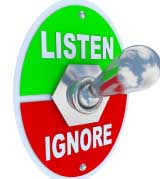The answer is basically the same as one would give to, “Why do I need an editor?”
The answer is simple. We cannot see our own mistakes.
There are three reasons for this. One, we may not know we’re making a mistake. Unless we are very experienced in writing in the specific area of our current work, there are things we may not know or understand. For instance, if I write a mystery, there will be certain police or medical procedures I don’t know about. Some I will research. Others I don’t understand that I need to.
There may be basic accepted practices of writing I don’t know. As an example, I might not know how to handle internalization. Do I use quotes, italics, first or third person, present or past tense, attribution?
The worse aspect of this is you may not know you don’t know. You do what you think is correct. Checking on what is accepted never enters your mind.
The second reason we can’t see our own mistakes is that our mind knows what we intend, and if our fingers don’t accomplish this, our mind will. I can write a sentence and leave out an important word. But when I read that sentence, my mind will automatically supply the missing word. I am not even aware that a word is missing.
 The third reason, and often the most important one, is that another set of eyes, another reader, may be able to point out things that don’t work, or don’t work well. Perhaps it is something that you, the author, know very well. But somehow, it is not transmitted to the reader. Or you may be trying to get a certain feeling across. The critique partner may tell you that you did not. A good critique partner might say you are too verbose. Or your dialogue is stilted. Or perhaps you spend too much time on description – or not enough. Another person may say the protagonist is not well drawn, or the motivation doesn’t come across. Maybe the pace is off.
The third reason, and often the most important one, is that another set of eyes, another reader, may be able to point out things that don’t work, or don’t work well. Perhaps it is something that you, the author, know very well. But somehow, it is not transmitted to the reader. Or you may be trying to get a certain feeling across. The critique partner may tell you that you did not. A good critique partner might say you are too verbose. Or your dialogue is stilted. Or perhaps you spend too much time on description – or not enough. Another person may say the protagonist is not well drawn, or the motivation doesn’t come across. Maybe the pace is off.
Another person can see so much that the author cannot. This is a valuable resource you should not fail to use.
A good critique partner can help on all of those. Ideally, she’ll know the area in which you are weak. If not, perhaps she may question your choice and cause you to do more checking. And when she reads the sentence in which you left out a word, her mind will not supply it. She will immediately see that you have left out a word.
The same thing is true of certain spelling errors. A spellchecker won’t catch many spelling problems. If you put down “your” when you need “you’re,” the spellchecker won’t catch it but your critique partner will. You type “there” when you mean “their”—no help from spellchecker. But the dependable critique partner will circle it in red.
There are two points I must make before I close. First, you need a good critique partner. You are not looking for someone to pat you on the back and say, “That’s the best thing I’ve ever read.” You need one who is knowledgeable in writing, particularly in your area. You need one who will catch the mistakes and tell you what they think you need to do to improve the writing.
The second point is, you must be willing to listen objectively. I’m not saying you must follow all suggestions. You must consider all suggestions and then implement those that make sense to you, that fit your style. Remember, the partner is not criticizing you, rather trying to help you improve your writing.
Select a critique partner carefully. Work closely with her. And both of you can become better writers.
